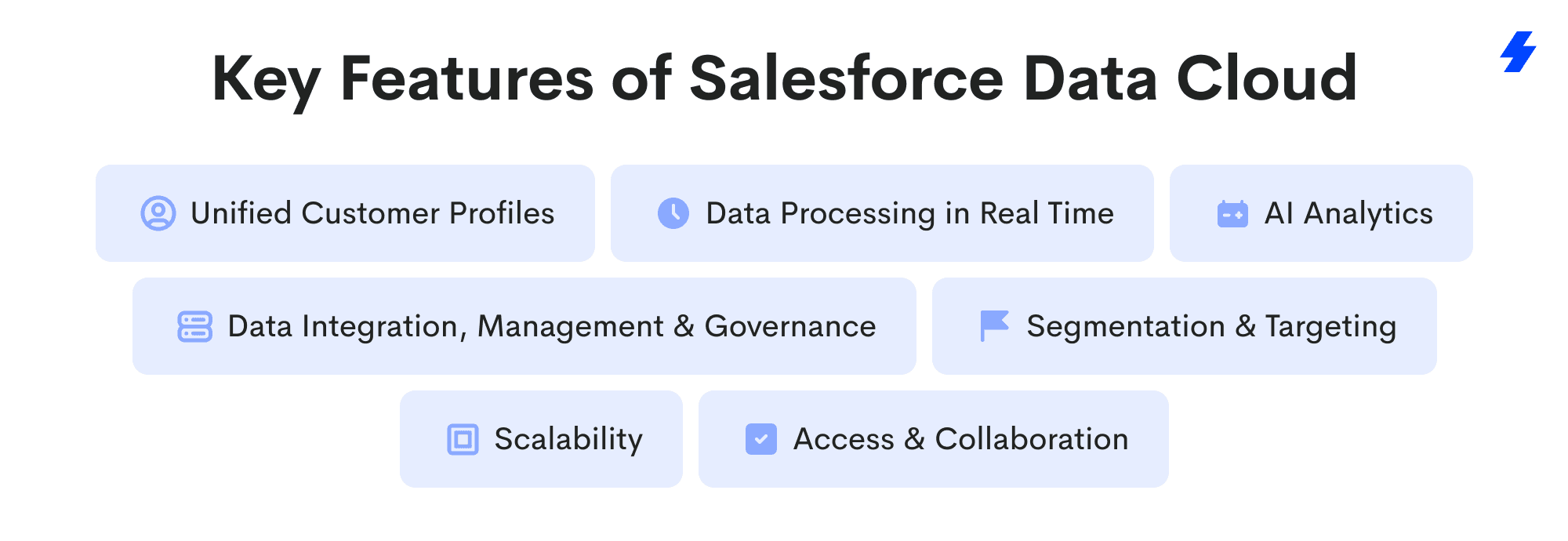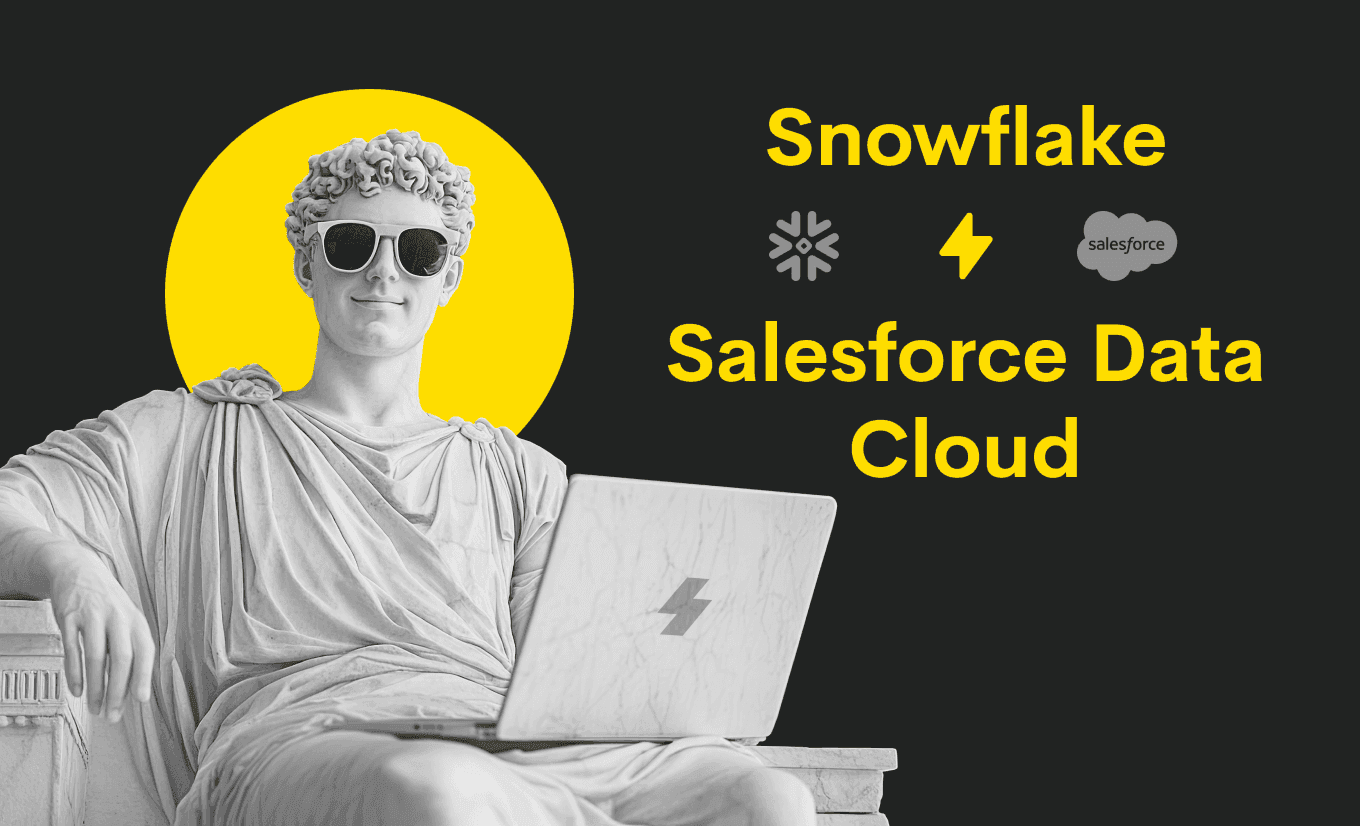With numerous options available when it comes to investing in a data cloud solution, it’s worth doing your research. And if you’re considering Salesforce Data Cloud vs Snowflake, this post could really help you. Let’s start things off with a brief overview of each platform:
Salesforce Data Cloud
Salesforce Data Cloud is a customer data platform (CDP) that gives you a unified view of the customer, enabling you to act on this information immediately with business activities like marketing, sales and advertising. It allows you to personalize customer experiences, creating more engaged users and driving business growth.
Snowflake Data Cloud
Snowflake is designed to provide secure data warehousing and scalable data storage. It empowers your people to work on standard datasets without any limitations. Its advanced analytics and reporting features let you optimize performance, no matter the data volume..
Choosing the right cloud solution is crucial for seamless data integration, robust security, scalable performance and regulatory compliance.
Salesforce Data Cloud Overview

Key Features
Salesforce has an array of features that help organizations optimize customer experiences and enhance operational efficiency. Let’s look at the key ones:
Unified Customer Profiles
Salesforce Data Cloud integrates data from various sources to help you build a comprehensive, single view of each customer.
Data Processing in Real Time
Data is processed and analyzed in near-real time, giving you up-to-date insights so you can make quick decisions to improve effectiveness.
AI Analytics
Salesforce's Einstein AI enables predictive analytics as well as deeper customer insights, again empowering you to act with as much information as possible.
Data Integration, Management and Governance
Salesforce Data Cloud connects seamlessly with other Salesforce applications as well as external systems, ensuring all data is accessible and harmonized. You also have access to tools that support data quality, governance, compliance and security.
Scalability
It’s a scalable solution too, able to handle large volumes of data as your requirements and business grow.
Segmentation and Targeting
Salesforce’s advanced segmentation features enable you to target specific customer groups with personalized marketing and services, optimizing your conversion rate.
Access and Collaboration
Secure data sharing is easily done across different departments and partners within the organization, as is secure API access for developers who you might need to build custom apps and work on integrations.
Integration with Other Salesforce Products
According to Salesforce itself, Data Cloud is ‘natively integrated with the Salesforce Metadata Framework’. For a user this means that data from other Salesforce sources can be turned into fields and standard objects, unifying all your Salesforce data.
Data Cloud is also designed with an open, extensible architecture that allows clean connections to platforms like Snowflake, without the need to move or copy data. This kind of approach makes it easier than ever to manage data and make the most of it in your business activities.
Snowflake Overview

Key Features
Let’s take a look at the key features of this data cloud, then move on to integrations and potential advantages for your business:
Security, Governance and Data Protection
Snowflake has countless features here to secure your data, from multi-factor authentication (MFA) to isolation of data, automatic data encryption and server protection.
Near-zero Management
Because it’s a cloud-based, fully managed platform, there’s almost no management needed.It even includes in-built performance tuning capabilities, which eliminate the need for manual administration.
Scalability
Owing to an auto-scaling feature, the data warehouse size adjusts without the need for your involvement. This is continuously monitored on your behalf to aid scaling.
Time Travel
This feature allows you to access historical data, which might have been deleted or altered, within a certain amount of time.
Sharing Data
Share data with others without having to create a new copy. This is done via Snowflake’s services layer, and no actual data is moved between accounts, which means you only have to pay for the account(s) used to query the shared data.
Query Performance
Data is stored in ‘micro-partitions’ (encrypted compressed files), which allows Snowflake to scan just these, rather than large tables of data. This considerably improves query performance.
Snowpark
This is a collection of libraries in which you can process other coding languages than SQL. Whichever language you prefer, you can write in and execute in Snowflake’s virtual data warehouses.
Integration Capabilities
Snowflake can easily be integrated with an array of external platforms, including, as mentioned, Salesforce. In fact, a combination of the two might offer more benefits than choosing one over the other.
Snowflake also integrates seamlessly with business intelligence (BI) and analytics tools such as Tableau, Looker and Power BI, cloud providers like Azure, Google Cloud and AWS, and data integration and ETL tools such as Talend, Fivetran and Informatica. On top of this, Snowflake integrates with cataloging and governance tools like Alation and Collibra, and data streaming tools such as AWS Kinesis and Apache Kafka.

Performance and Scalability
Salesforce Data Cloud
When it comes to handling data processing and storage, Salesforce Data Cloud performs incredibly well. It does this by integrating real-time data across its CRM, creating insightful customer profiles that can inform your business decisions. It stores data within Salesforce's scalable cloud infrastructure, optimized for customer interaction data and workflows.
In terms of scalability, Data Cloud’s cloud-based infrastructure allows businesses to easily add more users and increase storage as data volumes grow. Also, expanding customer data can be managed efficiently without compromising performance thanks to the platform’s real-time data processing and integration.
Snowflake
Snowflake performs to a high standard thanks to the separation of its storage and compute resources. This means data is stored in scalable cloud storage, while using compute clusters for processing. The fact that it supports diverse data types and uses SQL-based querying means excellent analytics capabilities, as well as data ingestion and transformation.
Snowflake provides scalability by automatically scaling storage and compute resources based on workload demands. This means your business can manage and process increasing data volumes and complex queries with ease - at least Snowflake can for you.
Security and Compliance
Salesforce Data Cloud
Data Cloud uses encryption and has robust access controls to keep your environment secure. It offers features such as data masking, tokenization, and regular security audits to protect your sensitive information. On top of this, Data Cloud adheres to industry standards like GDPR, HIPAA, and CCPA. For a more technical, in-depth view of Salesforce security you can learn more here.
Snowflake
Snowflake also follows regulatory standards, such as GDPR, HIPAA, SOC 2, and PCI DSS. Its security measures include end-to-end encryption, multi-factor authentication, and access controls based on roles. On top of this it uses data masking, network security to safeguard data and runs regular security assessments to ensure your data is secure. You can learn more about Snowflake security here.
Ease of Use and Implementation
Salesforce Data Cloud has an intuitive, user-friendly interface that fits well with the Salesforce ecosystem. This makes it easier for users who always work on Salesforce to adopt and navigate this platform. Existing Salesforce users can enjoy a shorter implementation time than those who don’t yet use Salesforce.
Snowflake’s web-based interface is simple and accessible to users with SQL knowledge and comprehensive documentation facilitates easy adoption. This platform also offers tools and support for data migration, making it easier for businesses to transition to Snowflake. However, it may take longer than Data Cloud for the initial setup, particularly where it’s necessary to migrate data and configure integrations with existing systems.
Pricing Structure
Salesforce Data Cloud
Data Cloud has a consumption-based cost, so pricing is not very transparent. Essentially, the more complex the usage you require, the more it will cost you. This is especially true around platform services and activation/segmentation. If you’re considering investing it’s wise to speak with an account executive to get a clear idea of the final price.
Salesforce customers receive a ‘digital wallet’ to track their credit usage and remaining balance.
At entry level there is a Zero Dollar SKU, which gives you up to 10,000 unified profiles. As you might expect, the free version doesn’t include a number of features you get with paid subscriptions, such as segmentations and activations, ad audiences, data storage and data services.
Data Cloud Starter is the least expensive paid version of Data Cloud, which includes the features missing in the free version. Find the latest prices here. Other versions include Einstein 1 Sales, Einstein 1 Service, Data Cloud for Commerce, Data Cloud for Industries. As mentioned, for specific prices it would be wise to speak to a Salesforce representative.
Snowflake
This solution also offers usage-based pricing, via credits, which are consumed as you perform various activities on the platform.
There are currently four Snowflake editions:
- Standard - Access to core features and functionality - $2 per credit.
- Enterprise - Standard features plus access to multi-cluster compute, granular governance, privacy controls, longer Time Travel windows and more - $3 per credit.
- Business Critical - All the features mentioned plus Tri-Secret Secure, private connectivity, failover and failback for backup and recover, plus more - $4 per credit.
- Virtual Private Snowflake (VPS) - All features in a secure, isolated, private environment - speak to sales for a bespoke price.
FAQs
What are the key differences between Salesforce Data Cloud and Snowflake?
As discussed in this article, Data Cloud and Snowflake are not identical offerings. Data Cloud focuses on providing a unified view of customer data, integrating with Salesforce and external apps and tools to optimize customer relationship management and personalization. Snowflake leans more towards scalable data storage, management and analytics.
How do I decide which platform is right for my business?
If your main focus is around enhancing customer engagement then you might be tempted to choose Salesforce Data Cloud. However, if you’re looking for a versatile platform that’s able to handle a range of data types and quantities, Snowflake could be the right option for you.
What are the primary cost components of each platform?
Pricing for Salesforce Data Cloud and Snowflake varies depending on your needs, your consumption and the subscription level you choose. The primary cost components will therefore depend on your specific requirements and how much you will rely on different features in either platform. Speaking to representatives and discussing what you need is probably the best plan, before opting for either data cloud solution.
Does MagicFuse provide implementation services for these data cloud solutions?
Yes, we do. We specialize in implementing Salesforce Data Cloud solutions and are happy to discuss your options with you to ensure you get the most out of your investment.
Are there any additional costs to consider with either platform?
For Data Cloud, you may incur additional costs from customization or consulting services for tailored integrations, as well as configurations beyond standard subscriptions. For Snowflake, potential add-ons include charges for data egress, premium support tiers, and usage of marketplace data or third-party integrations.













